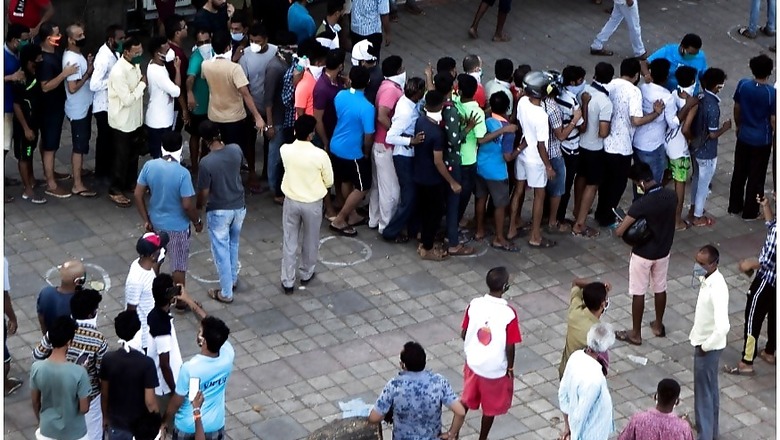
views
As soon as liquor shops reopened on Monday after 40 days of Covid-19 lockdown restrictions, a huge crowd in serpentine queues were seen outside the stores across the country flouting the norm of social distancing which was enforced to curb the further spread of the virus.
Desperate to buy liquor, people were seen jostling in queues which raised obvious concerns that this would lead to surge in the cases of novel coronavirus in the country.
Expressing concern over flouting of social distancing guideline, Vinod Giri, director general of Confederation of Indian Alcoholic Beverage Companies (CIABC), said that the governments failed to foresee the pent-up demand for alcohol and did not make required arrangements for a smooth implementation of the order to reopen shops.
"Not just liquor, this could have happened with any popular product. If you stopped selling sugar for over a month and then open shops after 40 days, people will no doubt rush towards shops to buy that. If only the government planned a little better to ensure a firm implementation of the orders, things would not have turned this bad," he said.
"This is a crowd management issue, there's no need to associate it with morality or binaries of good and bad. The problem is that you did not open enough shops for people to buy alcohol from. For instance, out of over 800 retails liquor outlets in Delhi, only about 50 were opened on Monday and Tuesday. There is bound to be rush if there is such an imbalance [in supply and demand], especially when stores have opened after a long gap," he explained, adding that many people are more inclined to stock over concerns that stores might be shut again.
Losses to the Industry
With the pandemic forcing governments across the globe to enforce stringent lockdowns, almost all kinds of businesses have taken a severe hit and the liquor industry in India is no exception to that.
The Indian liquor business is worth an estimated Rs 3-4 lakh crores, according to CIABC. As stores remained shut amid the nationwide lockdown implemented since March 25, the industry has suffered estimated losses worth nearly Rs 35,000-40,000 crores in the past 40 days, Giri noted.
He further said that the industry would not be able to fully recover these losses throughout the year, even with the latest surge in sales that has been witnessed in the past couple of days.
"The consumption behaviours are not going to change. This sudden surge in demand won't sustain as most sales are due to the fact that people are looking up to stock the liqour given the uncertainties. Going ahead, I think if more shops are allowed to reopen, then we can expect a 20 per cent recovery on losses, nothing more than that. That still makes it Rs 27,000-28,000 crores in losses for the industry," Giri explained.
He also said that the extra cesses that state governments have introduced with possible objectives of raising more revenue and managing the rush, may prove to be counterproductive in the long run.
“Unless this has been done for a very short period of time, this would definitely affect demand and encourage bootlegging, which won’t benefit the states in any way,” he added.
The Balancing Act
Liquor is a vital source of revenue for states. The excise duty on liquor sales contributes more than Rs 1.5 lakh crore in revenues for states, according to Reserve Bank of India (RBI) data.
However, with most sources of income lying dormant because of the restrictions enforced due to the pandemic, states are in desperate need of money and, therefore, the reopening of open liquor stores was decided.
Within a couple of days of reopening, liquor sales have added several hundreds of crores of rupees in states’ coffers, as per media reports. But the flouting of social distancing guidelines has also raised concerns over this bargain between finances and public health.
Speaking to News18.com, Giri said that the CIABC has written a letter to the Delhi government yesterday suggesting a multi-pronged strategy to balance both – the finances and the public health.
According to one of the suggestions, the government should allow more shops to reopen in non-containment zones on the basis of self-verification so that the crowd can be managed.
“The process to open the shops is slow because physical inspection is taking place to check whether the shops qualify for reopening or not. The government should allow shops to reopen on a self-declaration from the owners stating that they comply with all the guidelines issued by the Ministry of Home Affairs. If someone provides a false declaration, you can penalise them,” Giri suggested.
Another suggestion seeks to “seriously considering of online home delivery of alcohol, which state like Punjab is already in the process to implement.”
"This virus is going to remain for the next several months and it's important that we evolve our ways of doing business. With today's technological advancements, it's completely feasible to develop a robust online home delivery system. This would also allow states to trace stock from the warehouse to customers, and reduce physical labour, as we have seen in other countries," Giri remarked.
Among other things, the CIABC has also suggested considering liquor stores in malls, which have separate entrances from the premises, as standalone stores as well as to allow restaurants and bars to temporarily convert to retail outlets in order to sell out their stocks on MRP. The CIABC believes that this would increase the number of stores and balance out the demand and, thus, help manage the crowd.




















Comments
0 comment